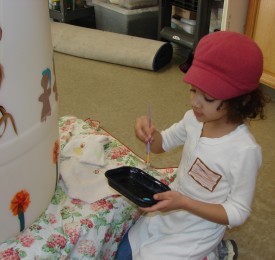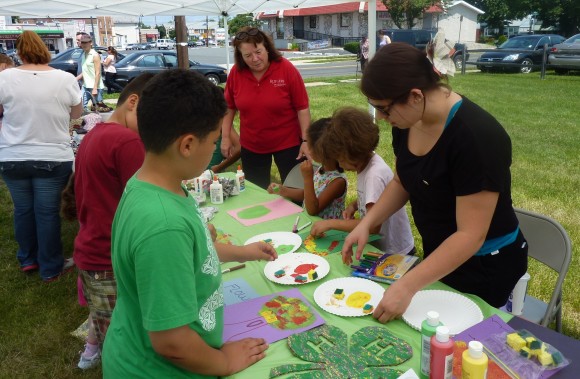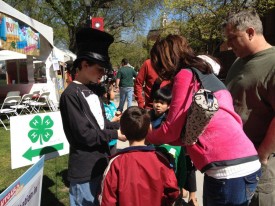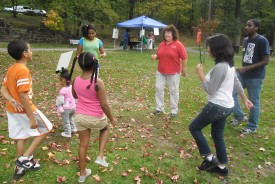The Expressive Arts 4-H program of Rutgers Cooperative Extension, a unit of the New Jersey Agricultural Experiment Station, was established in December of 2009 in recognition of the importance of the arts to the social, emotional, psychological and physical development of youth. Since its inception, the Expressive Arts 4-H program has provided performing, media and visual arts experiences to youth in grades K-13 from urban, suburban and rural communities throughout New Jersey. This has been achieved through arts activities offered on the Rutgers campus, as statewide initiatives, as well as in county-based programs.
The Expressive Arts 4-H program extends across academic disciplines to help youth and communities see their worlds in new and creative ways. Identified by Rutgers faculty and staff as a valuable teaching partner, Expressive Arts 4-H has enhanced learning experiences in Rutgers arts and sciences programs serving youth and communities throughout the state. For example, the Rain Barrel Art program, co-sponsored with the Rutgers Water Resources Program, engages youth in experiential learning which promotes water conservation and artistic self-expression. Rain barrels designed by 4-H club members are now preserving water at RCE Extension offices.

An Expressive Arts 4-H program participant from Essex County paints a rain barrel at RCE office in Roseland, NJ.
As part of a Rutgers Day program at the Zimmerli Museum, Expressive Arts 4-H conducted interactive arts activities engaging youth in cover designs related to the museum’s Children’s Book Illustrations Exhibit. At the Rutgers Jacques Cousteau Coastal Center at Bridgeton, elementary school students learned about oyster reefs through creative movement, storytelling, improvisation and mask making. In collaboration with the Landscape Architecture Department, Expressive Arts 4-H conducted the Fluid Movement Project in the Red Bank Middle School; through use of various arts media, students explored watershed formation and environmental stewardship. These are just some of the wide range of program activities, said Ellen Williams, Expressive Arts 4-H agent.
2013 marked the fourth year of Expressive Arts 4-H participation in Rutgers Day. In its “Imagination in Action” station, 4-Hers from across the state displayed their talents in visual arts, photography, performing arts and creative writing. In addition, Rutgers students have involved the public in interactive arts activities including, for example, instrumental music, painting, crafts, weaving and jewelry making.
In 2012, New Jersey 4-Hers were invited to submit poems, essays and stories related to the theme of “What Do You See?,” the national 4-H Communications and Expressive Arts theme for that year. The writing created by these NJ 4-H Creative Writing Contest participants was viewed by a national audience. Entrants were honored at a reception in New Brunswick attended by Larry Katz, director of Rutgers Cooperative Extension.
Williams’ development of an Arts Show Judging Guide has led to the expansion of 4-H Arts Shows in conjunction with 4-H State Animal shows. Since her tenure as Expressive Arts 4-H agent, 4-H arts shows have been added to the State 4-H Dog Quiz Bowl; State 4-H Dairy Bowl; and the State 4-H Rabbit, Cavy, Small Animal, Herpetology and Poultry Show.
“I’ve taught Expressive Arts 4-H workshops as a central component of many 4-H summer camps throughout the state, including those of Passaic, Gloucester, Mercer, Cumberland and Somerset counties,” said Williams. The Cumberland County Expressive Arts 4-H Camp was recognized as a 2010 Program of Excellence by the New Jersey Association of Extension 4-H Agents. The Somerset County 4-H Tops Camp, which incorporated writing, puppetry and dramatics, was the Northeast Regional Winner of the National Association of Extension 4-H Agents Excellence in Team Camping award. The Roleplaying for Real Life summer arts camp at Asbury Park High School’s SPOT (School Based Youth Services Program) was featured in a video documenting the impact of the program on the urban teen campers.
After school programming has also been enhanced by Expressive Arts 4-H programming. For example, in Mercer County’s 4-H after school digital filmmaking program in Trenton, Williams utilized her “Imagination in Action” Theatre Arts curriculum as a basis for teaching children storyboarding through improvisation.
According to Williams, youth find workforce development training more immediate and engaging through the use of arts approaches such as roleplaying, portfolio development and resume writing. Expressive Arts 4-H has provided this “hands on learning” to the Monmouth County and Burlington County Youth WorkPlus programs funded through the Workforce Investment Board Youth Councils.
County 4-H staff access Expressive Arts 4-H in recognition that creative arts activities help “bring to life” any subject matter content they may be teaching. For example, the Expressive Arts 4-H special interest program “Understanding Climate Change through Puppetry and Mask Making” came out of Camden County 4-H’s desire to make the climate change concepts in the Children, Youth and Families At Risk grant program more engaging and understandable for their youth.
Rutgers University students interested in the mission of the Expressive Arts 4-H program formed the RU Expressive Arts Outreach Club. Members have reflected their commitment to arts and civic engagement in a variety of ways. For instance, out of concern for Paterson children displaced from their homes and schools due to Hurricane Irene, the club engaged children in designing flower pots and planting flowers in their blighted community. They also conducted arts activities at Unity Square summer camp, New Brunswick schools, New Brunswick 4-H, Rutgers Gardens Children’s Program, and the Raritan River Festival. In addition, 14 students have contributed to the Expressive Arts 4-H program as AmeriCorps workers, Federal Work Study students, volunteers, interns, or independent project students. Their contributions include program development, program promotion, teaching and research. They represent a diversity of areas of academic study at Rutgers including, nutritional sciences, exercise science, psychology, history, public health, geography, criminal justice, Mason Gross School of the Arts undergraduate music and art, and graduate school of theatre; and the doctoral program of the Department of Biochemistry and Microbiology.
The arts are central to positive life skill development; through arts participation, youth develop such life skills as communication, self-esteem, decision making, leadership, goal setting, socialization, and responsible citizenship. Expressive Arts 4-H activities are individualized to the needs of participants. Short or long term programs are available in the following delivery modes: in school; after school; day and residential camps; independent study; workforce development; community based programs; 4-H clubs; and faculty, volunteer and staff in-service training.
Summer 2013 Expressive Arts 4-H activities include weekly creative writing and drama workshops with youth in the Behavioral Health Center (UBHC) of UMDNJ Newark, and activities at the New Brunswick 4-H program and Ocean County and Passaic County 4-H camps. To arrange an Expressive Arts 4-H program or to become an Expressive Arts 4-H volunteer, contact Expressive Arts 4-H Agent Ellen Williams at williams@njaes.rutgers.edu or 848-932-9214.




